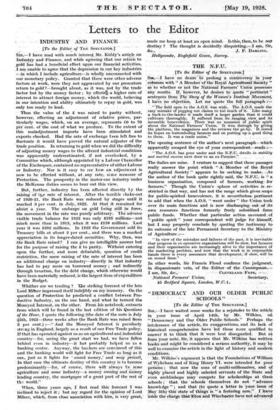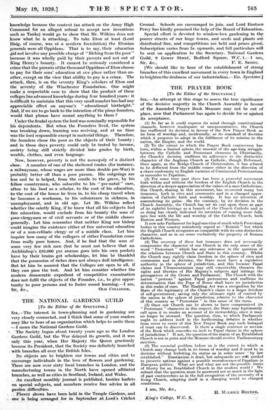"DEMOCRACY AND OUR OLDER PUBLIC - 'SCHOOLS "- - [To
the Editor of THE SPECTATOR.] have waited some weeks for a rejoinder to the article
in your issue of April 14th, by Mr. Wilkins, on " Democracy and Our Older Public Schools." -Perhaps _ the intolerance of the article, its exaggerations, and .its lack of histbrictil comprehension have led those mote qualified to 'answer it to think that it were best disregarded. But from 'your note, Sir, it appears that Mr. Wilkins has written boidra and might be considered a serious authOrity, it may be well to examine the article in the light of history and modern conditionS.
• Mr. Wilkins's argument is that the Foundations of William of Wykehain and of King Henry VI. were intended for . poor
peirkins ; that now the sons of multi-niillionaires; and of highly placed and highly salaried servants of the State and 'even arehbishops may compete for scholarships at these schools ; that the schoola themselves do not " advance knowledge " ; and that (to quote a letter in 'your. issue of may.41)-thig- state of things- is." a festering Sore." I leave 'wide the charge that-Eton and Winehester -have not advanced knowledge because the context (an attack on the Army High Command for an alleged refusal to accept new inventions such as Tanks) would go to show that Mi. Wilkins does not know what he is attacking. To take Eton at least (Lord Haig, of course, was at a modern foundation) the Etonian generals were all Oppidans.` That is to say, their -education did not involve any possible charge of "filching from the poor" because it was wholly paid by their parents and not out of King Henry's bounty. It cannot be seriously considered a crime that the parents of the thousand Oppidans of Eton choose to pay for their sons' education at one place rather than an- other, exceRt, on the view that ability to pay is a crime. The attack, then, is on the :seventy King's scholars of Eton and they seventy of :the Winchester Foundation. One might make a respectable case to, show that the product of these colleges has advanced knoWledge during four hundred years : it is difficult to maintain that this very small number has hadtmy appreciable . effect on anyone's " educational birthright." And, if we are to'go back lethe intention of the pious founders, would that phrase have meant anything to them ?
Under the, feudal system the lord was nominally reponsible for . , . But his dependents. But when the Founders lived, the system was breaking down, learning was reviving, and at no time was the lord responsible except in material things. Therefore, the founders chose the poor as the objects of their bounty; and in those days poverty could only be-tested by income, society being- still strictly divided- into- grades by birth, wealth, clothes, and even languages - . - Now, however, poverty is not the monopoly of a distinct class. A-member of one of the sheltered trades (for instance, a railwayman, whose wages are more than double pre-War) is probably better off than a poor parson. His outgoings are - less and he is- helped, from the cradle to the grave, by his • fellow-countrymen, who subscribe to his ," pre-natal" care, Often- to his food as a -scholar, to the cost of his education, to--the -cost of the -house he lives in-, to his cheap travel when 'lie- :becomes-- a workman-, to his subsistence in sickness, in unemployment, and in old age. Let Mr. Wilkins reflect whether the saintly King, if he knew that all his subjects had
• free educatiOn, would exclude from his -bounty -the sons of
• pourielergyinen or of -civil servants or of. the -middle classes generally. Let him remember that neither King nor bishop - -could -imagine the existence either- of free -universal education or - of a non-celibate clergy or of a middle class. Let him inquire how many of the collegers of either Foundation come from really poor homes. And, if he find that the sons of some very few rich men (but he must not believe that an Aiehhishop's £10,000 per annum goes into his own pocket) have by their brains got scholarships, let him be' thankful that the possession of riches does not always dull intelligence. -But.let him be assured that the Colleges are open to all, if they .can-pass the test. And let him consider whether the modern democratic expedient of competitive examination does- not -fulfil the objects of the Founder, i.e., to give oppor- tunity to poor persons and to- foster sound learning.—I am,



































 Previous page
Previous page